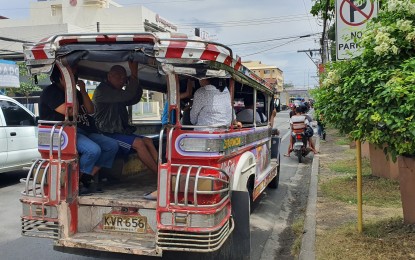
CLEAN AIR. A public utility jeepney plies along Velez Street in Cagayan de Oro City. The City Local Environment and Natural Resources Office said Thursday (June 9, 2022) more than 50 percent of vehicles, mostly coming from the public transportation sector, are struggling to comply with the anti-smoke belching requirement under the Philippine Clean Air Act of 1999. (PNA file photo by Nef Luczon)
CAGAYAN DE ORO CITY—More than 50 percent of the vehicles in the city are non-compliant with anti-smoke belching requirements, an official of the City Local Environment and Natural Resources Office (Clenro) said Thursday.
Clenro chief Armen Cuenca noted that most of the smoke-belching vehicles belong to the public transportation sector.
“Maybe they got tired of fixing their old vehicles because of the looming phase-out, that's why it continues to emit smoke,” Cuenca said in a press briefing here.
Data from the Land Transportation Office as of December 2021 showed that all the 100,726 vehicle registrations are for renewals.
Of the total registrations, motorcycles without sidecars topped the most renewed registrations at 48,280. This was followed by utility vehicles (UVs) with 23,735 renewals; cars with 10,645; and sport UVs with 6,602.
Cuenca also said some drivers deliberately evade checkpoints, especially those who supposed they will get penalties.
The anti-smoke belching requirement forms part of Republic Act 8749 or the Philippine Clean Air Act of 1999.
Cuenca said Clenro supports the national government's initiative to replace old public vehicles with new ones under the “transport modernization program.”
The Office of the Transportation Cooperative under the Department of Transportation is the main branch of government that oversees transport cooperatives. OTC assists cooperatives buy new units of vehicles that will serve the public with fewer smoking emission issues.
OTC has a regional presence in Northern Mindanao (Region 10) and closely works together with the Land Transportation Franchising and Regulatory Board–10. (PNA)
